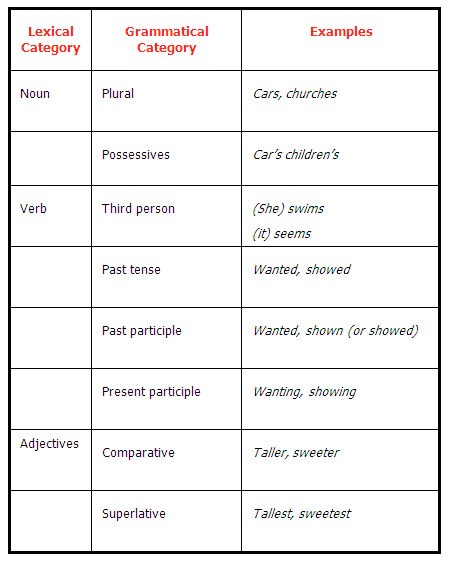Morphemes are the smallest meaningful units in words
There are two main types of morphemes — Free morphemes & bound morphemes
Bound morphemes are of two types — Derivational morphemes & Inflectional morphemes
Derivational morphemes are morphemes that have the effect of changing the lexical category or the central meaning of the word to which they are attached to
Inflectional morphemes are morphemes that create variant forms of a word to conform to different roles in a sentence or in discourse, without changing its lexical category
e.g.
When added to the noun doubt, the morpheme -FUL derives the adjective doubtful
The morpheme -MENT added to the verb establish derives the noun establishment:
In English such derivational morphemes tend to be added to the ends of words as suffixes
Some such derivations in English can thus be represented as:
Noun + -FUL = Adjective
Adjective + -LY = Adverb
Verb + -MENT = Noun
Verb + -ER = Noun
Adjective + -EN = Verb
Noun + -EN = Verb
English uses prefixes in a similar process
MIS- + Verb = Verb
UN- + Adjective = Adjective
UN- + Verb  = Verb
UNDER- + Verb  = Verb
RE- + Verb = Verb
EX- + Noun = Noun
In English prefixes typically change the meaning of a word but not its lexical category:
E.g.
paint — repaint
appear — disappear
favourable — unfavourable
Thus it can be concluded that derivational morphemes produce new words from existing words in 2 ways:
– by changing the meaning of a word
e.g. true Vs untrue
– changing the lexical category of a word
e.g. true Vs truly
Inflectional morphemes change the forms of the words:
On nouns and pronouns inflectional morphemes mark (semantic) notions like number and (grammatical) categories like gender and case
On verbs they mark such things as tense or number
On adjectives they serve to indicate degree
Inflectional morphemes create the so-called ‘related forms’
Many languages have large inventories of inflectional morphemes
English, however, has shed most of its inflections and today has only 8 remaining ones
They are:

Inflections in English
The 8 inflectional morphemes of English are fully productive
i.e. when new nouns, verbs and adjectives are added to the language (or when a child learns new words) they are extremely likely to be inflected like the examples shown
